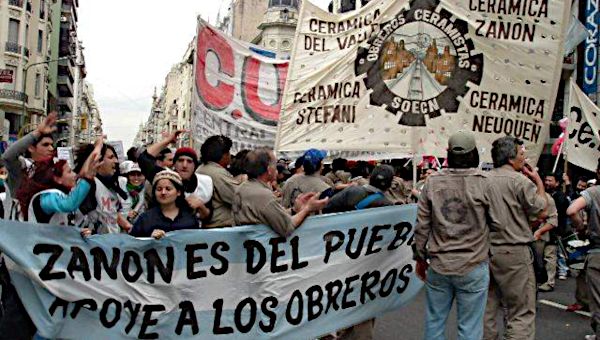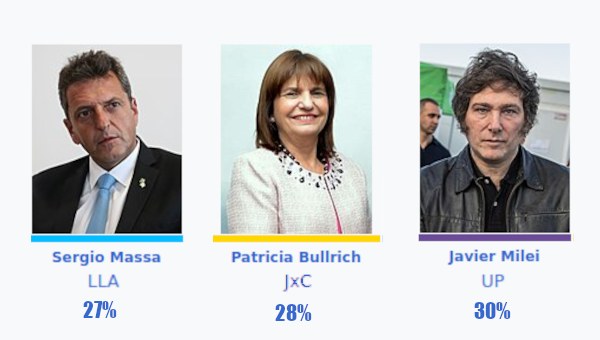Open Letter to Kristalina Georgieva (IMF)
Ms. Kristalina Georgieva
Managing Director of the International Monetary Fund
The Argentine government has said that it is counting on a firm promise from the IMF to extend a new loan to this troubled country. It does not take a keen observer of the national reality to notice the triple purpose behind this alleged financial bail-out. First, it is needed to stabilize the fragile situation of the extravagant economic project of the extreme right government; second, it will be used to placate the increasingly disenchanted and angry local public opinion in view of the phenomenal collapse of the income of registered wage earners, informal workers, and retirees and pensioners, something that last Wednesday’s massive demonstration and the government’s fierce repression displayed forcefully; and, third, as was done in 2018 with the loan granted to the government of Mauricio Macri, it will be used to improve the electoral chances of Milei’s ruling coalition for the crucial mid-term elections to be held in October of this year. From the foregoing, a number of issues arise that I would like to submit for your consideration.
You and the IMF Board of Directors should know that the person requesting the IMF’s help, President Javier Milei, is the target of growing evidence pointing to him and his closest advisors as clear participants in what, according to the world’s specialized press – The Economist, Forbes, Financial Times, Bloomberg, and global newspapers such as the New York Times – is considered the greatest scam in the history of cryptocurrencies. It will do little to improve the IMF’s problematic image to lend money to a person against whom such accusations are levied. He is, in turn, someone who has undermined the functioning of democratic institutions like no other president since 1983, violated the separation of powers, generalized the scandalous buying and selling of votes in Congress, and eaten away at not only the power of the State, which like a mole he seeks to destroy from within, but undermined the very foundations of the republican order. In short, by his deeds as much as by his verbal outbursts, Javier Milei is on his way to becoming a dangerous autocrat.

Borrowing In Violation of Congress
Furthermore, as if the foregoing were not a resounding warning voice, Mr. Milei intends to request this loan in open violation of the provisions of the National Constitution, Article 75, section 4, which expressly states that only this body, the Congress, has the power to contract loans on the Nation’s credit. Furthermore, section 7 of the same article states that only the National Legislative Power can decide on matters concerning the payment of the domestic and foreign debt of the Nation. President Milei has violated this constitutional requirement by sending Congress an Executive Order (Decree of Necessity and Urgency) which only vaguely informs the legislators about the alleged agreement with the Fund, saying nothing about the amount, the terms of the loan disbursements, or the interest rate at which it will be repaid. It should be recalled that the current Argentine government acted with the same disregard for the republican institutions when its Minister of Economy, Luis Caputo, ordered that the existing gold in the Central Bank be sent abroad, without providing any information on the purpose and specific characteristics of this operation.
In the case that concerns us here, the request to the IMF for a loan violates not only the National Constitution but also Law 27,612, passed in 2021, whose second article states that “any financing program or public credit operation carried out with the IMF, as well as any extension of the amounts – in addition to terms and conditions – of such programs or operations, shall require a law of the Honorable Congress of the Nation that expressly approves it.” In short, Javier Milei’s government is acting in open violation of the Constitution and the laws of this country, something that prima facie would violate the IMF’s own regulations, whose Board, if it did not take this situation into account, would become an accomplice in a violation of the Constitution and the laws of Argentina.
In view of this accumulation of irregularities, the debt that Argentina may contract becomes an “odious debt” not enforceable by the eventual creditors, in this case the IMF. This is something that has been sustained by US jurisprudence since the end of the 19th century up to the present day. In 1923, William H. Taft, former Justice of the Supreme Court of the United States, issued the Arbitral Award in favor of the newly formed democratic government of Costa Rica and against a claim by Great Britain demanding the payment of a debt of $250,000 (US) that had been granted to the dictatorial regime of Federico Tinoco Granados. Having violated all local legislation, Tinoco Granados himself, if anyone, should have paid that debt and not the people of Costa Rica.
Much later, in 2003, once the Iraq war had overthrown Saddam Hussein, Washington validated the non-payment of the debt contracted by this ruler with several European countries, arguing that the decision of a dictator should not compromise the welfare of his people once democracy had been restored. History speaks of many other similar examples: debts contracted outside of democratic consultation and in violation of the laws of the country, making their payment unenforceable.

In the case at hand, even more so when there are well-founded suspicions that this new loan requested of the IMF will be used, as it happened in 2018, to finance Argentina’s capital flight by a handful of large companies and powerful capitalists friendly to the regime. Jurisprudence, not only American but also European, establishes that if the lender, in this case the IMF, is aware of the violations to the legal order outlined above, it should refrain from extending the loan. Or, in the event that it does so as a result of political pressure – for example, from the US government, since it has the greatest voting power on the Fund’s Board of Directors – both the White House and the IMF would become accomplices of a fraudulently granted and contracted debt, which therefore does not create an obligation for the borrower to repay it.
I hope, Ms. Georgieva, that the Fund’s Board of Directors will take these considerations into account and avoid incurring a new and more resonant scandal than the one produced by the loan irresponsibly granted to our country in 2018 and which did so much harm to Argentina and which, in addition, projected a very negative image internationally of the professionalism of the criteria used by the IMF to grant its loans to different governments of the world. •
Cordially yours,
Atilio Boron





